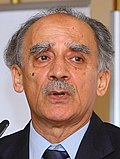| No. | Portrait | Minister
(Birth-Death)
Constituency | Term of office | Political party | Ministry | Prime Minister |
|---|
| From | To | Period |
|---|
| Minister of Planning |
|---|
| 1 | |  | Gulzarilal Nanda
(1898–1998)
Unelected, until 1952
MP for Sabarkantha, from 1952 | 24 September
1951 | 13 May
1952 | 11 years, 362 days | Indian National Congress | Nehru I | | Jawaharlal Nehru |
|---|
13 May
1952 | 17 April
1957 | Nehru II |
17 April
1957 | 10 April
1962 | Nehru III |
10 April
1962 | 21 September
1963 | Nehru IV |
| 2 | |  | Bali Ram Bhagat
(1922–2011)
MP for Arrah
(MoS) | 21 September
1963 | 27 May
1964 | 2 years, 125 days |
|---|
27 May
1964 | 9 June
1964 | Nanda I | | Gulzarilal Nanda |
9 June
1964 | 11 January
1966 | Shastri | | Lal Bahadur Shastri |
11 January
1966 | 24 January
1966 | Nanda II | | Gulzarilal Nanda |
| 3 | |  | Asoka Mehta
(1911–1984)
Rajya Sabha MP for Maharashtra, until 1967
MP for Bhandara, from 1967 | 24 January
1966 | 13 March
1967 | 1 year, 224 days | Indira I | | Indira Gandhi |
|---|
13 March
1967 | 5 September
1967 | Indira II |
| – | |  | Indira Gandhi
(1917–1984)
MP for Raebareli
(Prime Minister) | 5 September
1967 | 18 March
1971 | 3 years, 231 days |
|---|
| 18 March
1971 | 24 April
1971 | Indian National Congress (R) | Indira III | |
| 4 | |  | Chidambaram Subramaniam
(1910–2000)
MP for Palani | 24 April
1971 | 22 July
1972 | 1 year, 89 days |
|---|
| 5 | | | Durga Prasad Dhar
(1918–1975)
MP for Jammu and Kashmir | 23 July
1972 | 31 December
1974 | 2 years, 161 days |
|---|
| – | |  | Indira Gandhi
(1917–1984)
MP for Raebareli
(Prime Minister) | 2 January
1975 | 24 March
1977 | 2 years, 81 days |
|---|
| – | |  | Morarji Desai
(1896–1995)
MP for Surat
(Prime Minister) | 24 March
1977 | 28 July
1979 | 2 years, 126 days | Janata Party | Desai | | Self |
|---|
| – | |  | Charan Singh
(1902–1987)
MP for Baghpat
(Prime Minister) | 28 July
1979 | 14 January
1980 | 170 days | Janata Party (Secular) | Charan | | Self |
|---|
| – | |  | Indira Gandhi
(1917–1984)
MP for Medak
(Prime Minister) | 14 January
1980 | 8 June
1980 | 146 days | Indian National Congress (I) | Indira IV | | Indira Gandhi |
|---|
| 6 | |  | N. D. Tiwari
(1925–2018)
MP for Nainital | 8 June
1980 | 8 September
1981 | 1 year, 92 days |
|---|
| 7 | |  | Shankarrao Chavan
(1920–2004)
MP for Nanded | 8 September
1981 | 19 July
1984 | 2 years, 315 days |
|---|
| 8 | |  | Prakash Chandra Sethi
(1919–1996)
MP for Indore | 19 July
1984 | 31 October
1984 | 104 days |
|---|
| 9 | | 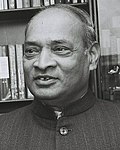 | P. V. Narasimha Rao
(1921–2004)
MP for Hanamkonda (until 1984)
MP for Ramtek (from 1984) | 4 November
1984 | 31 December
1984 | 71 days | Rajiv I | | Rajiv Gandhi |
|---|
31 December
1984 | 14 January
1985 | Rajiv II |
| – | | 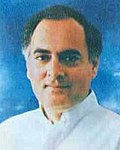 | Rajiv Gandhi
(1944–1991)
MP for Amethi
(Prime Minister) | 14 January
1985 | 25 July
1987 | 2 years, 192 days |
|---|
| 10 | | 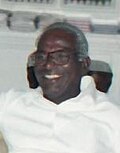 | P. Shiv Shankar
(1929–2017)
Rajya Sabha MP for Gujarat | 25 July
1987 | 25 June
1988 | 336 days |
|---|
| 11 | |  | Madhavsinh Solanki
(1927–2021)
Rajya Sabha MP for Gujarat | 25 June
1988 | 2 December
1989 | 1 year, 160 days |
|---|
| – | | 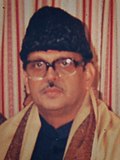 | Vishwanath Pratap Singh
(1931–2008)
MP for Fatehpur
(Prime Minister) | 2 December
1989 | 10 November
1990 | 343 days | Janata Dal | Vishwanath | | Self |
|---|
| – | |  | Chandra Shekhar
(1927–2007)
MP for Ballia
(Prime Minister) | 10 November
1990 | 21 June
1991 | 223 days | Samajwadi Janata Party (Rashtriya) | Chandra Shekhar | | Chandra Shekhar |
|---|
| Minister of Planning and Programme Implementation |
|---|
| 12 | |  | H. R. Bhardwaj
(1939–2020)
Rajya Sabha MP for Madhya Pradesh
(MoS, I/C) | 21 June
1991 | 2 July
1992 | 1 year, 11 days | Indian National Congress (I) | Rao | | P. V. Narasimha Rao |
|---|
| 13 | | | Sukh Ram
(1927–2022)
MP for Mandi
(MoS, I/C) | 2 July
1992 | 18 January
1993 | 200 days |
|---|
| 14 | |  | Giridhar Gamang
(born 1943)
MP for Koraput
(MoS, I/C) | 18 January
1993 | 15 September
1995 | 2 years, 240 days |
|---|
| 15 | | | Balram Singh Yadav
(1939–2005)
Rajya Sabha MP for Uttar Pradesh
(MoS, I/C) | 15 September
1995 | 16 May
1996 | 244 days |
|---|
| – | | 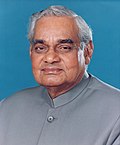 | Atal Bihari Vajpayee
(1924–2018)
MP for Lucknow
(Prime Minister) | 16 May
1996 | 1 June
1996 | 16 days | Bharatiya Janata Party | Vajpayee I | | Self |
|---|
| – | |  | H. D. Deve Gowda
(born 1933)
Unelected
(Prime Minister) | 1 June
1996 | 29 June
1996 | 28 days | Janata Dal | Deve Gowda | | H. D. Deve Gowda |
|---|
| 16 | |  | Yoginder K Alagh
(1939–2022)
Rajya Sabha MP for Gujarat
(MoS, I/C) | 29 June
1996 | 21 April
1997 | 345 days |
|---|
21 April
1997 | 9 June
1997 | Gujral | | Inder Kumar Gujral |
| – | |  | Inder Kumar Gujral
(1919–2012)
Rajya Sabha MP for Bihar
(Prime Minister) | 9 June
1997 | 19 March
1998 | 283 days |
|---|
| – | |  | Atal Bihari Vajpayee
(1924–2018)
MP for Lucknow
(Prime Minister) | 19 March
1998 | 13 October
1999 | 1 year, 208 days | Bharatiya Janata Party | Vajpayee II | | Self |
|---|
| Minister of Planning |
|---|
| – | |  | Atal Bihari Vajpayee
(1924–2018)
MP for Lucknow
(Prime Minister) | 13 October
1999 | 22 May
2004 | 4 years, 222 days | Bharatiya Janata Party | Vajpayee III | | Self |
|---|
| – | |  | Manmohan Singh
(born 1932)
Rajya Sabha MP for Assam
(Prime Minister) | 22 May
2004 | 26 May
2014 | 10 years, 4 days | Indian National Congress | Manmohan I | | Self |
|---|
| Manmohan II |
| 17 | |  | Rao Inderjit Singh
(born 1951)
MP for Gurgaon
(MoS, I/C) | 26 May
2014 | Incumbent | 11 years, 259 days | Bharatiya Janata Party | Modi I | | Narendra Modi |
|---|
| Modi II |
| Modi III |
|































